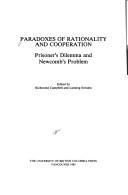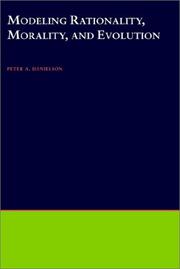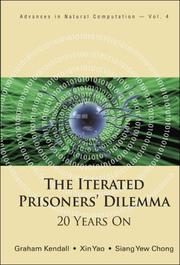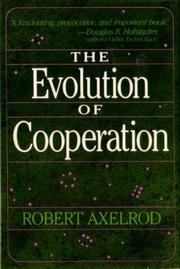| Listing 1 - 10 of 16 | << page >> |
Sort by
|
Book
ISBN: 3495475656 Year: 1986 Publisher: Freiburg Alber
Abstract | Keywords | Export | Availability | Bookmark
 Loading...
Loading...Choose an application
- Reference Manager
- EndNote
- RefWorks (Direct export to RefWorks)
Cooperation --- Institution building --- Prisoner's dilemma game --- Social institutions
Book
ISBN: 1316371425 110736017X 1316365425 1107044359 110762147X Year: 2015 Publisher: Cambridge : Cambridge University Press,
Abstract | Keywords | Export | Availability | Bookmark
 Loading...
Loading...Choose an application
- Reference Manager
- EndNote
- RefWorks (Direct export to RefWorks)
The Prisoner's Dilemma is one of the most fiercely debated thought experiments in philosophy and the social sciences, presenting the simple insight that when two or more agents interact, the actions that most benefit each individual may not benefit the group. The fact that when you do what is best for you, and I do what is best for me, we end up in a situation that is worse for both of us makes the Prisoner's Dilemma relevant to a broad range of everyday phenomena. This volume of new essays from leading philosophers, game theorists, and economists examines the ramifications of the Prisoner's Dilemma, the directions in which it continues to lead us, and its links to a variety of topics in philosophy, political science, social science, economics, and evolutionary biology. The volume will be a vital and accessible resource for upper-level students as well as for academic researchers.
Game theory. --- Prisoner's dilemma game. --- Cooperativeness --- Cooperation (Psychology) --- Social psychology --- Decomposed prisoner's dilemma game --- Choice (Psychology) --- Social interaction --- Games, Theory of --- Theory of games --- Mathematical models --- Mathematics --- Mathematical models.
Book
ISBN: 2130479405 9782130479406 Year: 1997 Volume: *20 Publisher: Paris: PUF,
Abstract | Keywords | Export | Availability | Bookmark
 Loading...
Loading...Choose an application
- Reference Manager
- EndNote
- RefWorks (Direct export to RefWorks)
Cooperation --- Coopération --- Coöperatie --- Prisoner's dilemma game --- Exchange --- Jeu du dilemme du prisonnier --- Echange (Economie politique) --- Cooperation. --- Coopération
Book
ISBN: 9782753593145 2753593140 Year: 2023 Publisher: Rennes : Presses Universitaires de Rennes (PUR),
Abstract | Keywords | Export | Availability | Bookmark
 Loading...
Loading...Choose an application
- Reference Manager
- EndNote
- RefWorks (Direct export to RefWorks)
La théorie des jeux décrit sous forme de jeux stratégiques les interactions d’individus rationnels placés en situation d’interdépendance. Son champ d’application est très vaste : économie, psychologie, science politique, ainsi qu’en biologie et en informatique. Paradoxalement, la théorie des jeux est peu utilisée sur les questions d’aménagement des territoires alors même qu’elles sont étroitement liées à celles de l’interdépendance des acteurs et aux problèmes stratégiques que cela pose. L’ambition de ce livre est de montrer l’intérêt de la théorie des jeux pour traiter des problèmes d’aménagement. En effet, la théorie des jeux répertorie en quelques jeux-type (dilemme du prisonnier, jeu de la chasse au cerf, etc.) la plupart des situations dans lesquelles se retrouvent des individus en interdépendance. Transférés aux territoires, ces jeux-type constituent une grille de lecture à partir de laquelle il est possible d’identifier et d’analyser les grands enjeux qui se posent aux acteurs des territoires (coopération/concurrence territoriale, conflits d’aménagement, effet NIMBY, etc.). Cette démarche qui réduit l’apparente complexité des situations d’aménagement à des cas types, permet une montée en généralité dans l’analyse des territoires. Ce faisant, elle complète l’ensemble des outils déjà disponibles qui visent à améliorer leur gouvernance. La démarche suivie ici est réflexive. Elle vise à structurer les représentations des acteurs des territoires afin de clarifier leurs choix stratégiques. L’objectif n’est pas de déterminer l’existence de solutions mais de préciser la nature des difficultés pour les atteindre. L’ouvrage s’adresse autant aux universitaires et étudiants en aménagement, qu’aux urbanistes et aux élus.
Aménagement du territoire. --- Théorie des jeux. --- Dilemme du prisonnier. --- Regional planning. --- Game theory. --- Prisoner's dilemma game.

ISBN: 0774802154 Year: 1985 Publisher: Vancouver University of British Columbia press
Abstract | Keywords | Export | Availability | Bookmark
 Loading...
Loading...Choose an application
- Reference Manager
- EndNote
- RefWorks (Direct export to RefWorks)
303.4 --- Dilemma --- Prisoner's dilemma game --- Choice (Psychology) --- Cooperativeness --- Cooperation (Psychology) --- Social psychology --- Psychology --- Decomposed prisoner's dilemma game --- Social interaction --- Decision making --- Logic --- Syllogism --- Onderzoeksstrategie in de sociale wetenschappen, soorten onderzoek --- Newcomb, William A. --- Newcomb, William --- Cooperativeness. --- Dilemma. --- Prisoner's dilemma game. --- 303.4 Onderzoeksstrategie in de sociale wetenschappen, soorten onderzoek --- Choice (Psychology).
Book
ISSN: 16210654 ISBN: 9782738116826 2738116825 Year: 2006 Volume: 170 Publisher: Paris: Odile Jacob,
Abstract | Keywords | Export | Availability | Bookmark
 Loading...
Loading...Choose an application
- Reference Manager
- EndNote
- RefWorks (Direct export to RefWorks)
Coopération (Psychologie) --- Jeux de stratégie (Mathématiques) --- Gestion des conflits. --- Égoïsme. --- Consensus (Sciences sociales) --- Interaction sociale. --- Cooperativeness --- Games of strategy (Mathematics) --- Conflict management --- Egoïsm --- Consensus (Social sciences) --- Social interaction --- Jeux de strategie (Mathematiques) --- Gestion des conflits --- Égoïsme --- Interaction sociale --- Egoism --- Coopération --- --Individu --- --Société --- --Prisoner's dilemma game --- Coopération (Psychologie) --- Jeux de stratégie (Mathématiques) --- Égoïsme. --- Individu --- Société --- Prisoner's dilemma game

ISBN: 0195125509 9780195125504 Year: 1998 Volume: 7 Publisher: New York (N.Y.): Oxford university press,
Abstract | Keywords | Export | Availability | Bookmark
 Loading...
Loading...Choose an application
- Reference Manager
- EndNote
- RefWorks (Direct export to RefWorks)
Ethics --- Rational choice theory --- Ethics, Evolutionary --- Prisoner's dilemma game --- Ethics, Evolutionary. --- Prisoner's dilemma game. --- Rational choice theory. --- Choix rationnel [Théorie du ] --- Decomposed prisoners' dilemma game --- Dilemma van de gevangene (Spel) --- Ethics [Evolutionary ] --- Ethics [Naturalistic ] --- Ethiek --- Ethique --- Ethique évolutionniste --- Evolutionary ethics --- Evolutionisme in de ethiek --- Evolutionistische ethiek --- Evolutionnisme en éthique --- Jeu du dilemme du prisonnier --- Keuzetheorie [Rationele ] --- Naturalistic ethics --- Rationele keuzetheorie

ISBN: 1280471670 1281346772 9786611346775 0585220913 9786610471676 0195352270 1602563241 9780585220918 9780195352276 9781280471674 6611346775 6610471673 0195125495 0195125509 9780195125504 0195125509 9780195125498 0195125495 0197730906 Year: 2023 Publisher: New York : Oxford University Press,
Abstract | Keywords | Export | Availability | Bookmark
 Loading...
Loading...Choose an application
- Reference Manager
- EndNote
- RefWorks (Direct export to RefWorks)
These essays focus on questions that arise when morality is considered from the perspective of rational choice and evolution. It links questions like ""is it rational to be moral?"" to the evolution of co-operation, and uses models from game theory, evolutionary biology and cognitive science.
Ethics. --- Rational choice theory. --- Ethics, Evolutionary. --- Prisoner's dilemma game. --- Ethics, Naturalistic --- Evolutionary ethics --- Naturalistic ethics --- Ethics --- Ethical relativism --- Social choice --- Deontology --- Ethics, Primitive --- Ethology --- Moral philosophy --- Morality --- Morals --- Philosophy, Moral --- Science, Moral --- Philosophy --- Values --- Decomposed prisoner's dilemma game --- Choice (Psychology) --- Social interaction

ISBN: 1281121835 9786611121839 9812770682 9789812770684 9789812706973 9789812770684 9812706976 9781281121837 6611121838 Year: 2007 Volume: 4 Publisher: Singapore: World scientific,
Abstract | Keywords | Export | Availability | Bookmark
 Loading...
Loading...Choose an application
- Reference Manager
- EndNote
- RefWorks (Direct export to RefWorks)
In 1984, Robert Axelrod published a book, relating the story of two competitions which he ran, where invited academics entered strategies for the Iterated Prisoners' Dilemma. The book, almost 20 years on, is still widely read and cited by academics and the general public. As a celebration of that landmark work, we have recreated those competitions to celebrate its 20th anniversary, by again inviting academics to submit prisoners' dilemma strategies. The first of these new competitions was run in July 2004, and the second in April 2005. Iterated Prisoners' Dilemma: 20 Years On essentially provi
Prisoner's dilemma game --- Games of strategy (Mathematics) --- Cooperativeness. --- Consensus (Social sciences) --- Authority --- Common good --- General will --- Power (Social sciences) --- Cooperation (Psychology) --- Social psychology --- Games with rational pay-off (Mathematics) --- Rational games (Mathematics) --- Strategy, Games of (Mathematics) --- Game theory --- Group theory --- Mathematical optimization --- Matrices --- Topology --- Decomposed prisoner's dilemma game --- Choice (Psychology) --- Social interaction --- Computer simulation. --- Axelrod, Robert M. --- Games of strategy --- Cooperativeness

ISBN: 0465021212 0465021220 9780465021222 9780465021215 Year: 1984 Publisher: New York: Basic books,
Abstract | Keywords | Export | Availability | Bookmark
 Loading...
Loading...Choose an application
- Reference Manager
- EndNote
- RefWorks (Direct export to RefWorks)
Social ethics --- Cooperativeness --- Games of strategy (Mathematics) --- Conflict management --- Egoïsm --- Consensus (Social sciences) --- Social interaction --- Coopération (Psychologie) --- Jeux de strategie (Mathematiques) --- Gestion des conflits --- Égoïsme --- Consensus (Sciences sociales) --- Interaction sociale --- Egoism --- Coopération --- --Individu --- --Société --- --Prisoner's dilemma game --- 338.22 --- Prisoner's dilemma game --- Human interaction --- Interaction, Social --- Symbolic interaction --- Exchange theory (Sociology) --- Psychology --- Social psychology --- Decomposed prisoner's dilemma game --- Choice (Psychology) --- Games with rational pay-off (Mathematics) --- Rational games (Mathematics) --- Strategy, Games of (Mathematics) --- Game theory --- Group theory --- Mathematical optimization --- Matrices --- Topology --- Egocentricity --- Philosophy --- Self-interest --- Authority --- Common good --- General will --- Power (Social sciences) --- Conflict control --- Conflict resolution --- Dispute settlement --- Management of conflict --- Managing conflict --- Management --- Negotiation --- Problem solving --- Social conflict --- Crisis management --- Cooperation (Psychology) --- Economische organisatieleer. Economisch beleid. Economische politiek --- Conflict management. --- Cooperativeness. --- Egoism. --- Prisoner's dilemma game. --- Social interaction. --- Consensus (Social sciences). --- Games of strategy (Mathematics). --- 338.22 Economische organisatieleer. Economisch beleid. Economische politiek --- Individu --- Société
| Listing 1 - 10 of 16 | << page >> |
Sort by
|

 Search
Search Feedback
Feedback About UniCat
About UniCat  Help
Help News
News